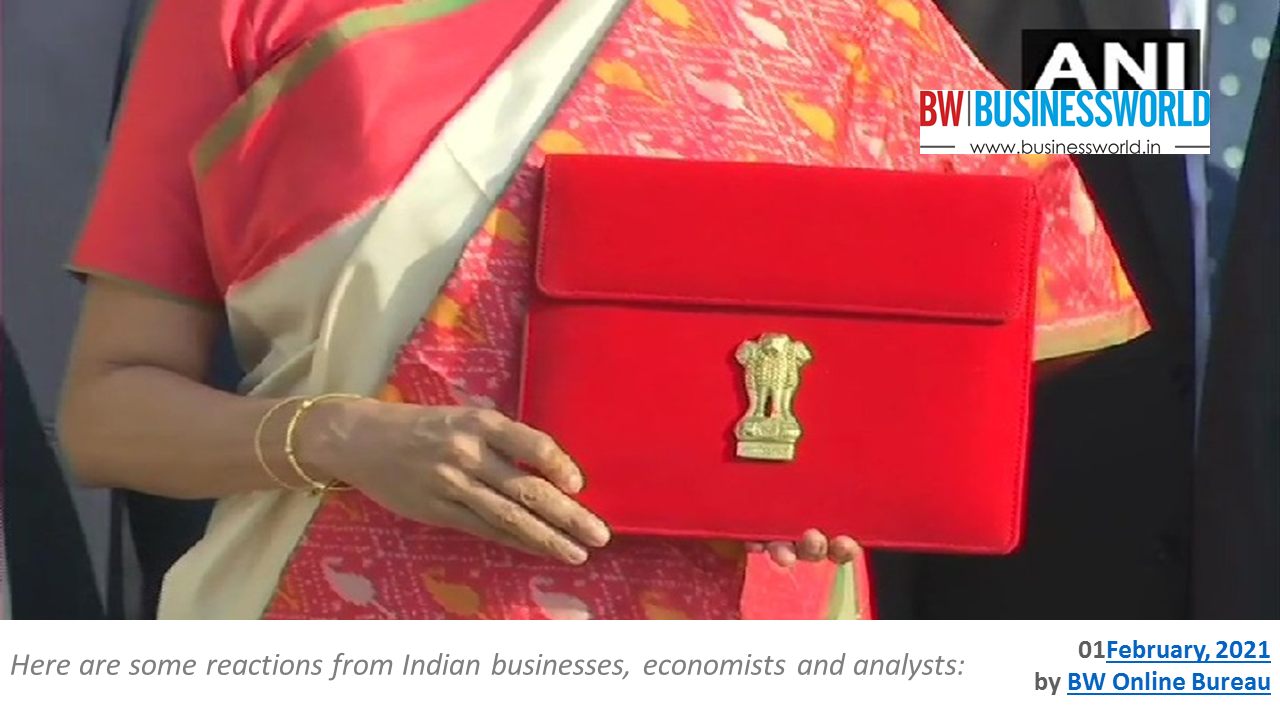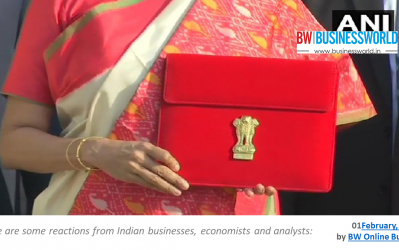
Unveiling an annual budget on Monday aimed at reviving an economy that plunged into deepest recorded slump amid the COVID-19 pandemic, Finance Minister Nirmala Sitharaman proposed doubling healthcare spending to 2.2 trillion Indian rupees ($30.20 billion).
The government will launch a new federal health scheme with an outlay of around 641 billion Indian rupees ($8.80 billion) over the next six years, she told parliament kicking off her budget speech.
India, which has the world’s second highest coronavirus caseload after the United States, and currently spends about 1% of gross domestic product on health, among the lowest for any major economy.
Here are some reactions from Indian businesses, economists and analysts:
SAKSHI GUPTA, SENIOR ECONOMIST, HDFC BANK, GURUGRAM
“The 2021-22 budget announced some long-awaited reforms and was a big bang in many ways. The government refrained from consolidating the fiscal deficit significantly and focused on supporting growth.”
“The set-up of a development finance institution to finance the infrastructure pipeline is a significant step. The other notable step has been the introduction of an asset reconstruction company, which is likely to provide the much-needed support for banks as stressed assets rise due to the pandemic.”
RAJOSIK BANERJEE, PARTNER AND HEAD, FINANCIAL RISK MANAGEMENT, KPMG, MUMBAI
To address concerns around asset quality, credit loss and liquidity stress, this budget has been proactive to infuse additional capital of 200 billion rupees to PSU banks for providing continued credit access to wholesale and retail borrowers, and therefore push growth agenda.
ANIRBAN CHAKRABORTY, MANAGING DIRECTOR & CEO, TFCI LTD
“Budget 2022 indeed provides a well chartered framework to boost the travel sector. Higher allocation of ₹2,83,846 lakh crore for health and wellness, which also includes ₹35,000 crore for Covid-19 vaccines promises to ensure fast rollout of mass vaccination and restoring normalcy sooner than expected. This will give a much need boost to the travel & tourism demand in the coming year. Furthermore, greater emphasis on health infrastructure also positions India as the global wellness destination of tomorrow. A greater emphasis on debt financing, coupled with the budget’s reformist tone including measures such as higher disinvestment target, raising of farm income, sops for affordable housing and various other initiatives to give an overall boost to the economy and spurring consumption & investment. These reforms & growth-oriented initiatives are all set to position India as an evolving global tourism hub and drive higher demand for funding propelling the NBFC sector.”
BABITA SHEKHAR, ADVISORY BOARD MEMBER, iE3 INNOVATIONS PVT LIMITED
With a focus on infrastructure spending, aimed at creating jobs and revitalizing the economic growth on the one hand, and investment in Human Capital through increased spending in Healthcare, Education and Infrastructure sectors, this budget gives promise of a recovery from the pandemic slump. Measures like One Nation One Ration Card, and digital platform to collect their information for future national programs, will mitigate the plight of migrant workers, enabling a return to productive work. It is encouraging to see Government of India, especially GST council, leveraging advanced technology like Al and deep analytics to identify tax evaders and increase their collections in the last few months, heralding the era of synergy between economics and technology to chart the pathways for achieving ambitious growth plans.
RUPA REGE NITSURE, GROUP CHIEF ECONOMIST, L&T FINANCIAL HOLDINGS, MUMBAI
A strong capex push of 5.54 trillion rupees ($75.76 billion) is growth positive. This, combined with the enhanced spending on the health sector, will go a long way in supporting economic recovery. However, the actual revenue generation, both via tax and non-tax receipts during FY22 will be instrumental in the management of fiscal situation.
SUJAN HAJRA, CHIEF ECONOMIST, ANAND RATHI SECURITIES, MUMBAI
The indications are that the government is going to do more to promote growth rather than maintaining fiscal discipline. This is a welcome move as it will have a positive impact on growth. Also, we are seeing a lot of measures on conditions of doing business which was required. The intent for reforms is also strong.
RAGHUNANDAN SARAF, FOUNDER & CEO, SARAF FURNITURE
Union Finance Minister Nirmala Sithraman by announcing that Modi government will introduce a bill for the development of financial institution has shown a clear path for the growth on financial infrastructure in the Atmanirbhar Bharat. Further, Modi government’s announcement of a sharp increase in Capital Expenditure and thus providing Rs 5.54 lakh crores will develop momentum for financial infrastructure domain. Further, the announcement of the development of investor charter should also be welcome as it will protect the hard-earned money of a number of investors.
Shri Sanjiv Puri, Chairman & Managing Director, ITC Limited
It is a visionary and growth-oriented budget that provides further impetus to build India’s competitiveness as also foster inclusive growth. The enhanced capital expenditure, particularly on infrastructure, will create livelihoods and provide an accelerated thrust to the V-shaped recovery trajectory. The heightened spends on agriculture and rural infrastructure development are aligned to the comprehensive policy interventions aimed at creating competitive agri value chains to raise farm incomes. These augur well for the economy and will spur a virtuous consumption-investment-employment cycle.
Shoubhik Dasgupta, Counsel Pioneer Legal
FDI in insurance being increased to 74% is a big change. The immediate impact will be for the big joint ventures to re-think their strategy in India with their domestic partners. How soon the Insurance Act will be amended to reflect these changes will of course, remain to be seen.
Rajesh Narain Gupta, Managing Partner, SNG & Partners
The proposal by FM Nirmala Sitharaman to exempt dividend payments on Real Estate Investment Trusts (REITs) and Infrastructure Investment Trusts (InvITs) from TDS will play a key role in boosting global and domestic investor sentiment in the sector. This will provide a huge push to the real estate and infrastructure sector of the country will help home-buyers to avail real estate price appreciation benefits without the hassles of price fluctuations and help in boosting the creation of income-generating infrastructure like roads, railways, and power transmission lines. With the extension of tax holiday for affordable housing projects for a year, the government has reiterated a steadfast commitment to creating a sustainable social housing model in the country and ensure access to housing for vulnerable sections of the society.
——————————————-<><><><><><>—————————————-
Published in:


